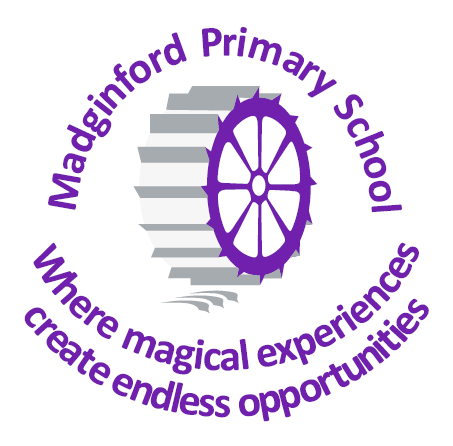Teaching & Learning
Teaching & Learning at Madginford Primary School
Learning is at the heart of everything we do here at Madginford Primary School. Teaching staff hold the highest of expectations for each individual child; they build strong, caring relationships that allow them to know their children exceptionally well.
The National Curriculum tells us what we need to teach. Up-to-date research and an excellent understanding of how we learn guides how we teach.
This knowledge and understanding has been used to produce an ambitious, challenging curriculum that:
- Makes sure every child accesses a rich, broad and balanced range of learning experiences.
- Promotes British Values and weaves spiritual, moral, social and cultural experiences (S.M.S.C) throughout the curriculum to broaden the experiences of our children and support them to understand their place in the wider, global community around us.
- Values each child and supports them in their understanding of positive relationships and knowledge of self through the teaching of P.S.H.E (Personal, Social and Health Education).
- Engages children’s curiosity, encouraging them to ask questions and delve deeper into their learning.
- Encourages children to challenge themselves, persevere and take pride in their learning
- Ensures all children have opportunities to develop basic knowledge, allowing them time to deepen their knowledge and understanding; children moving from ‘novice’ to ‘expert’.
- Allows children to make connections between curriculum areas, within topics, across the year and across the key stage.
- Provides ‘real-life’ opportunities to reinforce learning and consolidate their growing bank of knowledge and skills. These could include visitors to school, school trips, forest school, sporting opportunities as well as wider curriculum experiences such as a trip to the theatre.
At Madginford Primary School, we know that being a ‘successful learner’ allows children to embrace life’s challenges with perseverance and resilience. We want our learners to interact with the world around them with confidence and respect; to make informed choices; to stand up for their own beliefs; to listen to and empathise with the beliefs of others and to be able to work successfully and co-operatively as part of a team.
A ‘successful learner’…
- Understands that learning is always happening
- Understands that learning is about asking questions, digging deeper and challenging themselves to succeed
- Understands that learning can be demanding, perseveres and knows when and how to ask for help
- Knows that learning means practising again and again until knowledge and skills are secure
We support children to become ‘successful learners’ by…
- Aiming high – opportunities are planned for children to deepen knowledge and apply it in different contexts
- Knowing what knowledge (information, skills, techniques etc) children need to remember at the end of the lesson, unit of work and year group
- Deciding on the most effective teaching approaches to move children from ‘novice’ to ‘expert’ learners
- Making connections with prior learning to build on and deepen knowledge and understanding
- Carefully planning opportunities for children to practise their knowledge and skills, allowing them to challenge themselves at all levels
- Ensuring opportunities for children to work independently, showing perseverance and determination
- Asking questions that support and challenge children
- Providing focused feedback that ensures children know their next steps in learning
- Continually reviewing learning to see how successfully children have understood and remembered what they need to know adapting and adjusting future learning to meet the needs of children at an individual, group or class level.
Our children will…
- Have confidence and faith in their own ability and a willingness to continually challenge themselves
- Know and understand what they are learning and how this fit into the planned curriculum
- Be able to demonstrate what they have learnt and a self-awareness that they are ready to move on.
- Understand the skills and attitudes of a successful, independent learner
- Take responsibility for and use their classroom environment as a learning aid.
